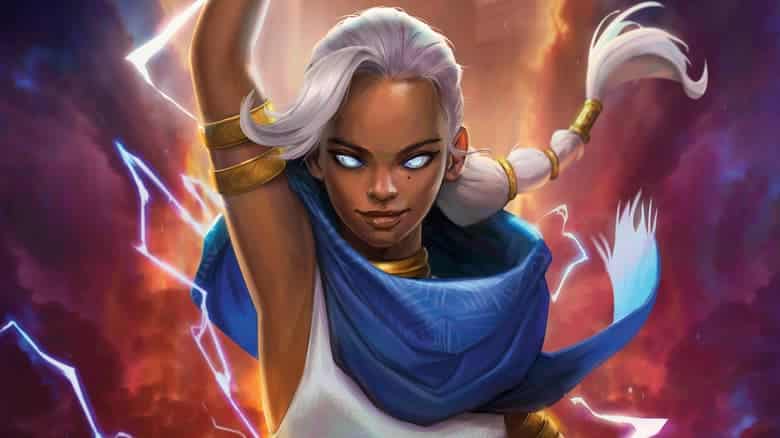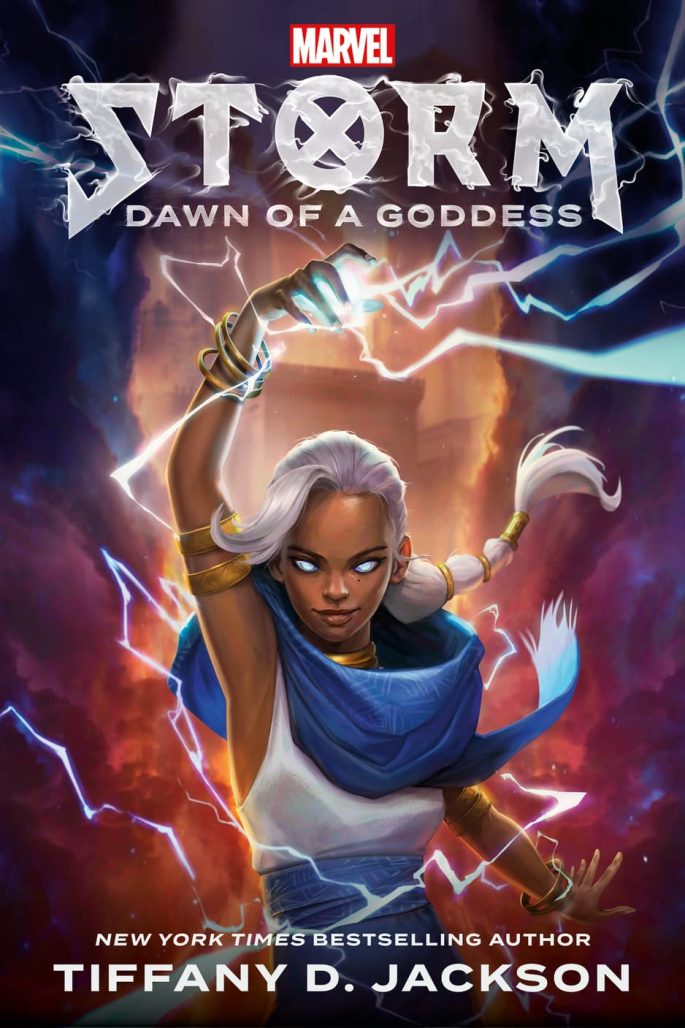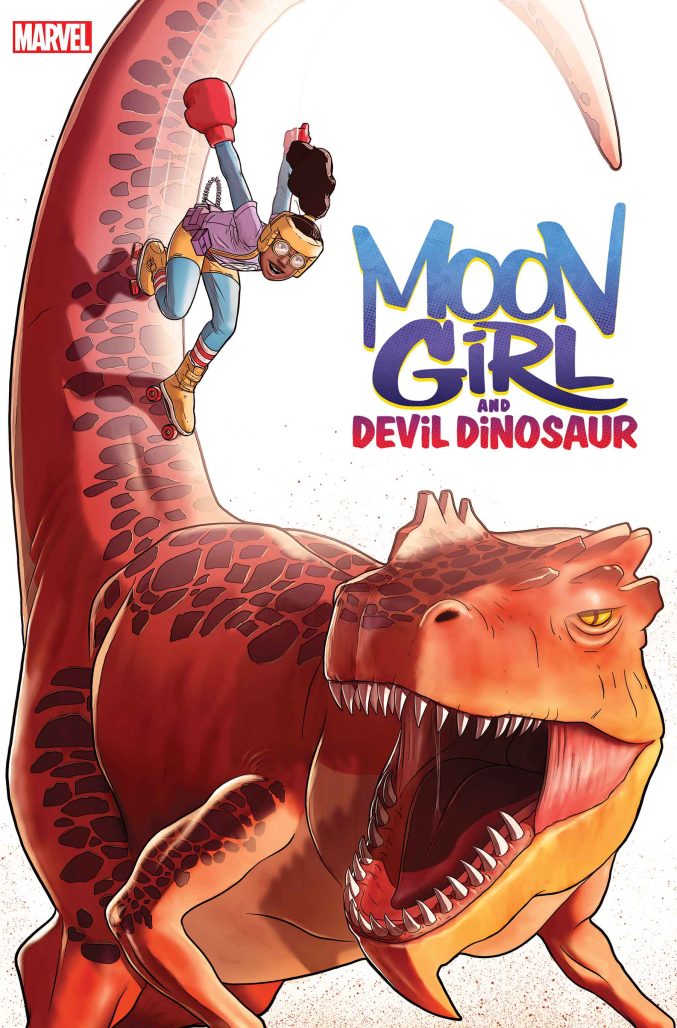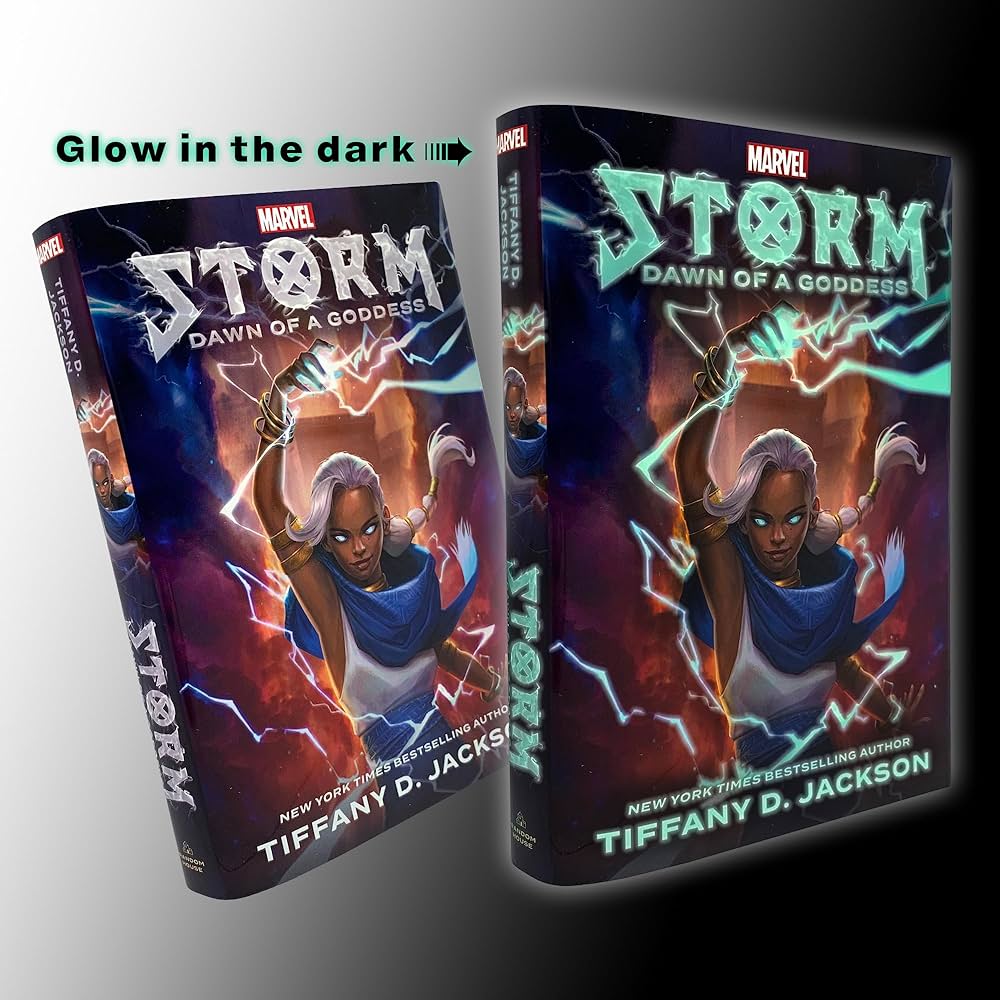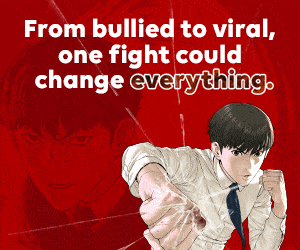At a Penguin Random House event at New York City’s P&T Knitwear, The Beat caught up with NAACP Image Award winner and bestselling author Tiffany D. Jackson to discuss Marvel’s newest YA novel, Storm: Dawn of a Goddess. Available in bookstores everywhere as of June 4, 2024, the story looks at the early life of the beloved Marvel mutant Ororo Monroe, a.k.a. Storm, and how she grew up to be a strong, confident woman who co-led the X-Men and became an Avenger.
The publisher’s official description of the book reads, “Telling her story in an authentic, joyful, and powerful way, Tiffany D. Jackson—in collaboration with Marvel—provides a vivid imagining of Storm’s life as Ororo Munroe before she grew into the fierce superhero revered by millions across the globe. Tiffany is the New York Times bestselling author of Grown, Monday’s Not Coming, Allegedly, White Smoke, The Weight of Blood, and more, and with STORM, she is doing something she’s never done before—stepping into the world of speculative fiction.”
You can learn more about Storm: Dawn of a Goddess in the interview below, where Jackson discusses her newly released book, the importance of diverse voices, and her geeky origins and passions (even featuring a shoutout to some surprise guests).
This interview was shortened and edited for clarity.
CHRISTIAN ANGELES: I think every author has their own career superhero origin story. Can you start by sharing yours?
TIFFANY JACKSON: The first word I ever spelled on my own was nose. See, we used to trace our letters as children, and I realized that at age four, you can place these things together to create words. I knew then that I was going to be an author. My mom remembers I went into the kitchen and said: “I’m gonna be a writer.” I was kind of discouraged from it initially; no one wants you to be a starving artist, and writing can be a bit scary that way. It’s brave for those who want to be a writer, and it took time to get here, but I always knew I would get it. I knew at age four that was gonna be my superpower: to make stories about anything.
ANGELES: So young. When was your debut book, then?
JACKSON: Allegedly came out in 2017. I first started getting serious about writing it in 2012 during Hurricane Sandy. I was stranded, a library refugee, as I like to call it, living right here. I’m from Brooklyn.
ANGELES: I had no idea you’re from the area. So, Allegedly was your debut novel, but from what I gather, Storm: Dawn of a Goddess is your first foray into fantasy. How challenging was it to write compared to your previous work?
JACKSON: I feel like I’m very rooted in reality. Sometimes, it’s hard for me to dissociate and think of anything magical, powerful, or, in other words, even though I’ve been a sci-fi, comic, and horror lover my entire life. This was my escapism. So, it’s hard to put myself in the shoes of that type of character and write it myself. It was definitely a craft challenge but also really fun.
ANGELES: What are some of your favorite sci-fi or horror movies?
JACKSON: I’m gonna sound really old school, but I love Aliens.
ANGELES: The franchise? The Geiger one with <xenomorph noise> that’s awesome!
JACKSON: I was like that girl! I also am a fan of Michael Myers before Jason or Freddie. Well, first, Jason. Then Freddie.
ANGELES: I love that there’s a hierarchy.
JACKSON: Yeah, in those regards. But when I was little, I was really into Thor. One birthday, I even dressed up as Thor. My mom used to work in fashion, so she got the cape made, and my dad went to FAQ Schwartz and bought me the hat and hammer, which is what I ran around in at nine. It’s something I always loved.
ANGELES: Wait, really? Thor?
JACKSON: See, there was this movie called Adventures in Babysitting, and the young girl around my age kept talking about Thor. So, one day, I went to a comic book store in Brooklyn, which is sadly no longer there, but I did find and read all these comics about him.
ANGELES: Going from the God of Thunder to the Thunder Goddess makes sense. In Storm: Dawn of a Goddess, you depict Ororo as a thief and lock picker, yet above all else, a Goddess of the weather. There are many details about her origins here, but what liberties were you given to play with versus stuck to the source material?
JACKSON: I tried to stick closely to source material mostly because I was afraid; Storm is a very beloved character. While writing this book, I was given full access to the Marvel Comics library, like every single book ever made. So I did a lot of research to nail down her origins, expanding it out with some real details, especially with her life in Cairo, as that was never fully explored. Marvel approved. See, some authors, when they touch on this type of IP, really try to expand, but I know just how much people love Storm. I love her just as she is, too.
ANGELES: You also created original characters for your story depicting Ororo’s earliest days. Can you talk a bit about them?
JACKSON: We needed to give Storm something that solidified her. She needed a type of found family before she joined the X-Men because when she leaves and becomes a member of the team, she transitions very well into this newfound family. So, I wanted to give her that grounding, which showed she already knew what that experience was like being a friend, mother, and sister all in one because she learned from the best.
Something huge to Ororo is that a master thief had already trained her, growing up with many boys around her. Here, I realized she needed to know how to be whip-smart and sarcastic. I wanted to be sure we had these characters around Ororo to root out some of her future characteristics so she could pick up a little bit from each of them because there are, in those boys, a lot of these Easter eggs that we see in the comics later. Her found family is where she adopted some of her vibe and personality.
ANGELES: I also couldn’t help but notice a lot of emphasis on Ororo’s hair throughout Storm: Dawn of a Goddess. As there’s been a lot of talk about Black women’s experiences regarding hair, hairstyle, and hair loss since 2022, was this intentional?
JACKSON: It was very intentional. In the comics, oftentimes, people overlook her when talking about her hair, which sounds weird because she’s a Black woman with blue eyes and a big, boisterous hairdo. While it always looked great, there was never any emphasis on her feelings. Since hair is also very important to black women, I wanted to talk about its texture and how Ororo’s hair made her feel different, so she often hid most of it.
I think it’s very important to talk about when bringing a character like Storm to life. She’s very much a Black girl. In Black girlhood, hair is important, which I can attest to. I wanted to make sure that we focused a lot on the fact that this is something she’s hyper-aware of and one of the things that made her hide in many ways. It’s this recurring theme of constantly trying to make herself small because she already feels so different.
There’s a point in the story when she realizes this is doing an injustice… To me. To my growth. So she lets her hair out and lets everything fly free. It’s about being who you are and your need to embrace that.
ANGELES: Ever watched and/or read Moon Girl and Devil Dinosaur? They have a whole thing dedicated to something like this.
JACKSON: I was supposed to work on the comic for that. Unfortunately, I didn’t have the skillset for writing a comic book just yet. I know that sounds silly, but I think it’s a whole different part of the brain to use. When they approached me, it was also deep in the pandemic, and I was working on other things. But I love that story. I’m so excited the cartoon is out, and I’m so very excited to see little girls watching and reading Lunella’s story.
ANGELES: I loved the series as well. But back to it, there are a lot of references to the use of a Hijab for Storm’s hair. I also noticed that, in general, your story has many Arabic and Afro-centric themes. How important was it to depict cultural accuracy?
JACKSON: Incredibly important. Especially since one of the things overlooked in some of the older comic books was the accuracy and appreciation of other people’s cultures. For example, the origin story of Storm leaves Cairo and walks straight to Kenya. If you look at a map, there’s a lot of territory in between. It’s not exactly how the world works; it’s just hopping between those countries.
So, I wanted to shine a light on the culture of where she came from. That’s one of the reasons I took a trip to Cairo: to trace her roots. It was really fun as a tourist. Even then, I kept thinking: Storm would totally steal my wallet out of my pocket right now because I was foolish and just walking around like nothing was wrong.
Also, I appreciated that Cairo has such a rich culture in Egypt, which I wanted to shine a light on, along with Kenya. I wanted to capture where Ororo’s family is from and where she ends up, and it was such a joy to bring those elements to the story, adding rich culture to be sure’s alive on the page. Sometimes, people try to write characters they’re not from and are very one-dimensional. I sought to make Storm three-dimensional in every way.
ANGELES: I love that in the book, she only pickpockets from wealthy tourists and never indigenous people. That would so be Storm!
JACKSON: Right? There are no stoplights, so Cairo can be congested. It felt like there was a million people there. However, I also liked how there were streets where there was nothing but old bookstores. It’s one of the features I wanted to put in the story because it was cool to see that they still appreciate their history even though things have modernized.
ANGELES: I believe it. So, every YA story features elements of growing up. Could you summarize what you’ve done with Storm’s character growth arc for this tale?
JACKSON: It’s about growing up feeling different but then learning you’re meant to be part of something bigger, and this story is about Ororo leaning into that. Oftentimes, teens internalize that they’re not supposed to be something and, instead, are supposed to be something entirely different. Then, this small voice inside creeps up and becomes impossible to ignore. That’s one of the bigger themes of Storm’s growth in her X-Men life, so I wanted her to listen to her voice inside her and find that power within.
ANGELES: Okay, spoiler-bit time. I was surprised to see T’Challa in this book and LOVED the cute YA romance between the two. What was it like for you to write those scenes?
JACKSON: One thing I remember from the comics when I was younger was the big wedding between Black Panther and Storm. I remembered asking, “Where did this come from? All of a sudden, they just got together? What happened?” Later on, someone told me they were childhood sweethearts. I returned to find those comic books and realized, “Oh, they were! Not only that, but they also had such an effect on one another.”
T’Challa was this prim and proper prince. He’d have funny moments, but he also changed how he was a king once he started dating Storm. Storm, meanwhile, very much wanted to be a part of the streets, but T’Challa kind of forced her to see her greatness and even taught her how to fight. He told her to really embrace her power. Throughout their lives, even when they weren’t together, they inspired each other. I was excited to write that. It was my favorite part.
And, of course, I was also super nervous. If Storm is beloved, T’Challa is definitely beloved, so I cannot mess this up! I wanted to ensure it was accurate, and Marvel helped a lot and had their hand in this novelization. It was good to know what to expect.
ANGELES: They were cute in the book, with their personalities bouncing off one another.
JACKSON: It was also fun to throw in Easter eggs. I feel like a lot of the general public doesn’t know they were together, but it’s important. Oftentimes, we don’t realize Storm has historically been underappreciated for being one of the most powerful mutants in the universe, so you’re acknowledging everyone else but this lone Black woman who’s supposed to be an omega-level mutant with this fabulous hair? She always comes in and saves the day, and I think we must acknowledge we brought it to light – oh, sorry, I just saw my elementary school teacher walking in.
ANGELES: Oh, that’s cool!
Tiffany waves hi to her teachers, her earliest influences.
JACKSON: Sorry, I had the same elementary teacher, Millie Fulford, for 2nd, 5th, and 6th grade. My 4th grade teacher, Ms. Powers, just walked in with her. They usually come to all of my events. They know I have wanted to be an author my entire life, so I’m not surprised. As a kid, they set a desk aside for me to write during school. Also, Millie probably remembers the Thor outfit because I wore it to her class.
ANGELES: Awesome, next question. In this book, T’Challa often cracks dad jokes. I loved the characterization, but I was wondering what were some of your favorite character moments to write?
JACKSON: Of course, the corny dad jokes were my favorite. One of my favorite criticisms Ororo has of T’Challa is how green he is. He doesn’t have a lot of swag, which bothered her so much. Meanwhile, T’Challa was bothered by how bothered Ororo was, and I love the idea in YA of the hate-to-love, enemies-to-lovers vibes. It was also just fun to write how Storm would just get frustrated to the point where her powers would explode and how T’Challa would just be completely unfazed by it, going oh, there’s that. I love them together in that regard.
ANGELES: These are some of the book’s best parts.
JACKSON: It’s funny, though; someone asked me not long ago who my favorite Storm love interest was, and while I love young T’Challa and Storm, I’m actually a Storm and Wolverine fan. I think it’s because I thought Panther and Storm got divorced for the dumbest reason, so I got legitimately frustrated with T’Challa at the time. Still, Wolverine was always hovering; there were these moments, and I remember them kissing in the cartoon in the original animated series (X-MEN TAS S4 E1+2). I just remember seeing that as a young girl going OH. MY. GOD.
ANGELES: Now, I have to rewatch it. Storm is not just a superhero icon but one of the most powerful Black women ever depicted in superhero fiction. How does it feel to have finished writing a book about her origins?
JACKSON: It feels… scary? Because this was such a task I had to take on, and I hope I did it right. I wanted to give her justice and give her her just dues, it’s why I was panicky writing it not wanting to go too far from the source material. Also, I would go online and watch all these TikToks and YouTube videos of all these comic book heads talking about Storm in general. I wanted a temperature check to see how people felt about her. What was the mood, in general? I answered that as much as possible. It’s scary because I hope I do her justice.
ANGELES: I think you do. I thought it was great. Final question, though: What overall message would you like any young readers to leave with after picking up this book?
JACKSON: I want the reader to feel empowered to do anything and to never shrink yourself. That’s the biggest message: to follow your calling despite how uncomfortable it may make you feel and despite the fear of feeling different. I was always the kid who was the outsider. I was always the other. In high school, I was the only Black girl. In publishing scenes, I was the only Black girl in many places. I never want to get to the point where I have to shrink myself anymore. I want to get as big, bold, and brave as possible, and I want young people to feel that way, too.
Tiffany D. Jackson’s STORM: DAWN OF A GODDESS launched on June 4, 2024, and you can get a copy everywhere books are sold, including audiobooks.



